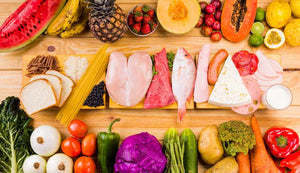This year more than ever we are receiving so many questions about protein & how it can support immune health.
It’s important to understand no single nutrient can run the immune system on its own. It requires a balance & moderation.
The immune system is a complex network of cells, tissues, and organs that’s why the following nutrients along with regular exercise & plenty of water all aid in a healthy immune function ;
PROTEIN
Is an energy-yielding macronutrient involved in thousands of different functions in the body, including immune function. Protein can help maintain, build and recover tissues in the body. Protein is found in animal-based foods and in varying amounts across plant-based foods. Include a variety of foods from meat, seafood, nuts and seeds. Choose high-quality lean proteins.
COMPLETE HIGH-QUALITY PROTEIN SOURCES INCLUDE:
BEEF • CHICKEN • TURKEY • DUCK • EGGS • SEAFOOD (SALMON, TUNA, TROUT, MACKEREL, HERRING, COD, LOBSTER, CRAB, OCTOPUS, SHRIMP, SCALLOPS,) • GAME MEATS • DAIRY PRODUCTS (COTTAGE CHEESE, YOGURT, MILK) • SOY PRODUCTS (TEMPEH, TOFU, EDAMAME) AND OF COURSE PRO MATRIX RANGE OF PROTEINS.
VITAMIN C
Helps support the immune system by promoting various cellular tasks, which support immune function. Select from a varietyh of citrus fruits and dark green leafy vegetables.
FOODS RICH IN VITAMIN C INCLUDE
ORANGE • GRAPEFRUIT • LIME • LEMON • TANGERINE • POMELO • MANDARIN • PINEAPPLE • GUAVA • CANTALOUPE • STRAWBERRY • KIWI • TOMATO • SPINACH • ARUGULA • CHARD • KALE • COLLARD GREENS
VITAMIN A
Is essential for overall well-being of cells. Vitamin A provides antioxidant support and even helps regulate the immune system.Select from a variety of fruits and vegetables that are dark green, bright red and orange.
FOODS RICH IN VITAMIN A INCLUDE:
LIVER • FISH • EGGS • MILK • YOGURT • CHEESE • COTTAGE CHEESE • PUMPKIN • BUTTERNUT SQUASH • CARROTS • SWEET POTATOES • RED PEPEPRS • ASPARAGUS • KALE • SPINACH • BROCCOLI • GREEN LEAF LETTUCE • ROMAINE LETTUCE • MANGO • PAPAYA • GOJI BERRIES • APRICOTS
VITAMIN D
Is primarily known for its role in bone health, but also helps support immune function. Exposure from UV sunshine rays can help the human body to produce vitamin D. he cells in your skin can produce sufficient levels of vitamin D, however synthesis may be limited based on where you are in the world, sun exposure, and level of melanin in skin. Vitamin D is also found in very few foods, therefore may be added to some foods such as milk, yogurt, juices, breads and ready-to-eat breakfast cereals.
VITAMIN D IS NATURALLY FOUND IN
BEEF LIVER • COD LIVER OIL • EGG YOLKS • SARDINES • MACKEREL • SALMON • TUNA • MUSHROOMS EXPOSED TO CONTROLLED UV LIGHT
VITAMIN E
Is the primary antioxidant within cells and its main role is to provide antioxidant support. Vitamin E can help quench free radicals, the byproduct of occasional oxidative stress from acute intense exercise. Vitamin E can help quench free radicals, the byproduct of occasional oxidative stress from acute intense exercise.
FOODS RICH IN VITAMIN E INCLUDE:
PLANT OILS(WHEAT GERM, OLIVE, CANOLA, SUNFLOWER, SAFFLOWER, CORN, COTTONSEED) • ALMONDS • HAZELNUTS • PEANUTS • WALNUTS • DARK GREEN LEAFY VEGETABLES
ZINC
Is a mineral that helps to support immune function. Zinc is found in a wider variety of foods, but mainly present in animal-based foods like meat, fish, poultry and dairy. Zinc may also be found in a variety of legumes, grains, nuts and seeds.
FOODS RICH IN ZINC INCLUDE:
OYSTERS • CRAB • LOBSTER • PORK • BEEF • CHICKEN • CHEESE • BEANS • CHICPKEAS • OATMEAL • PUMPKIN SEEDS • CASHEWS • ALMONDS
